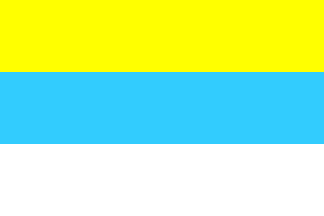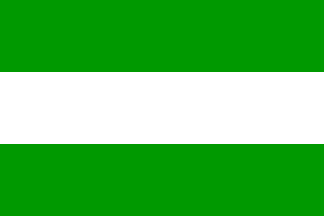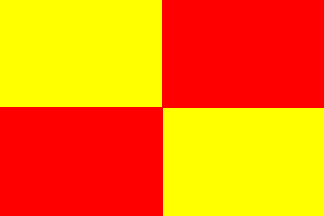
image by Ivan Sache, 6 January 2009

Last modified: 2009-08-08 by dov gutterman
Keywords: education |
Links: FOTW homepage |
search |
disclaimer and copyright |
write us |
mirrors
See Also:
Other Institutions:

image by Ivan Sache, 6 January 2009
"Colegio CEDID San Pablo" was founded in 1988 in
Bosa, Bogotá.
The flag of the institute, as shown graphically on the website
of the institute, is horizontally divided yellow-light
blue-white.
Ivan Sache, 6 January 2009

image by Ivan Sache, 14 Febuary 2004
CEIPA is the 'Centro de Investigacion y Planeamiento
Administrativo'. It was founded in Medellin in 1972 by Antonio
Mazo Mejia and his wife. In 1992, the CEIPA was granted the
status of Universitary Foundation.
The flag of CEIPA is yellow, for excellence, with two thin white
stripes, for transparency required for excellence in business, in
the upper and lower parts of the flag, and the shield of the
institute in the middle.
The shield of CEIPA is U-shaped, for University. The symbol
placed on the shield was used in the Middle Ages by merchants.
The four arrows symbolize the four compass directions, in which
commerce should spread, whereas the moon crescents and stars are
symbols of business. This medieval symbol was selected to recall
that both business and university concepts date back to the
Middle Ages.
Source: <virtual.ceipa.edu.co>,
located by Dov Gutterman.
Ivan Sache, 14 Febuary 2004

image by Ivan Sache, 3 Febuary 2009
"Liceo 'Celedón'" was founded in Santa Marta,
Department of Magdalena, on 24 November 1905 (Decree No. 118).
Named after Rafael Celedón (1833-1902)), appointed Bishop of
Santa Marta in 1891, the institute was declared "National
Monument" on 17 December 1993 (National Decree No. 2529).
The flag of the institute, as described on the website
of the institute, is made of the two colours white and green.
The arrangement of the stripe is not detailed. The emblem of the
institute designed by Diomedez Varas shows on the shield's right
a flag horizontally divided green-white-green, presented as
"a flag, green and white symbolizing peace and hope".
White represents purity of heart and mind.
Green represents hope, strength and energy dedicated to study.
Ivan Sache, 3 Febuary 2009

image by Ivan Sache, 10 January 2009
Dr. Jesús Casas Manrique founded "Liceo Infantil"
in 1934 in Bogotá. The institute was renamed in 1937 "Liceo
de Cervantes", as a tribute to the founder's father, Dr.
José Joaquín Casas, who was found of the Spanish culture and,
especially, of the writer Cervantes. The modern grounds of the
institute were built in 1944; in 1949, the founder of the
institute transfered it to Augustinian fathers, only requiring
that the name of the institute would not be changed.
The flag of the institute, as graphically shown and described on
the website
of the institute, is quartered yellow-red, the colours of
Spain and Bogotá.
It appears that the previously reported flag is wrong.
Ivan Sache, 10 January 2009
Previously reported flag

image by Ivan Sache, 9 January 2004
The flag of the College is square, horizontally divded
yellow-red-yellow, with the emblem of the college in the middle.
Source: <www.voluntad.com.co>
(defunct), located by Dov Gutterman.
Ivan Sache, 9 January 2004
"Universidad CES", founded on 5 July 1977 in
Medellín, was recognized as an university by the Ministry of
National Education on 22 March 2007 (Decree No. 1371).
CES offers programs in Biology, Law, Physiotherapy, Biomedical
Engineering, Medicine, Odontology, Psychology, Veterinary and
Zootechny.
The flag of CES, as described on the CES
website, is blue and white. Blue represents tranquillity,
confidence, harmony and the sense of responsability. White
represents integrity, strength, purity and vigilance.
The arrangement of the colours is not given.
Ivan Sache, 20 December 2008
"Instituto Tecnológico del Cesar" (ITUC) was
recongnized by the Assembly of the Department of Cesar in 1973
(Decree No. 050) and inaugurated on 15 May 1973. ITUC was
transformed into "Universidad Popular del Cesar" by the
Ministry of National Education on 25 June 1993 (Decree No. 3272).
The main seat of the university is located at Valledupar; there
is a secondary seat in Aguachica and presence in the
municipalities of Chimichagua, Tamalameque and Maicao.
The flag of the university, as shown graphically and described on
the university
website, is vertically divided green-white (c. 2:1) with a
green stripe in the upper corner and the emblem of the university
in the middle of the white stripe.
The emblem of the university was designed by Jairo Obregón
Salazar, student in Law. It is made of a diamond, black in its
upper part and blue with a yellow sun in its lower part, placed
on a red device, surrounded by two laurel branches. The name of
the university is written in black letters above the emblem,
while its motto, "Educación y Futuro" ("Education
and Future"), is written in black letters under the emblem.
The diamond represents the university, permanently irradiating
light on the vast field of knowledge. Blue represents the
transparency of the sky and the revealed truth, while black
represents darkness and ignorance. The sun recalls Prometheus
stealing a sun ray to show the truth to mankind. Laurel has
always been associated to culture and was also used to crown the
Greek heroes and Roman emperors.
Ivan Sache, 28 December 2008

image by Ivan Sache, 9 June 2001
Colegio Champagnat - 2:3 (by default) flag, horizontally
divided light blue-white. The flag is shown on <www.voluntad.com.co>,
located by Dov Gutterman. The flag is a symbol of life
and grace, placed under Mary's protection. White stands for power
and purity (state of grace). Blue stands for wisdom and infinity.
Blue has been used as Mary's color in religious iconography for
the Middle Ages. White is of course the colour of virginity.
Ivan Sache, 9 June 2001

image by Ivan Sache, 30 January 2009
A first boys' education institute was founded on 5 October
1908 by Marist Brothers in Sibundoy, Department of Putumayo.
"Normal de Varones de Sibundoy" was created on 6 May
1962 and superseded in 1969 by "Collegio de Bachillerato
Masculino 'Champagnat'". The institute is named after St.
Marcellin Champagnat (1789-1840, canonized in 1999), the founder
of the Marist Order.
The flag of the institute, as shown graphically and described on
the website
of the institute, is horizontally divided blue-white-yellow.
Blue means the presence of the Blessed Virgin in the institute
and represents the Marist community.
White represents peace and justice.
Yellow represents our intellectual resources.
Ivan Sache, 30 January 2009
UDCA ("Universidad de Ciencias Aplicadas y
Ambientales" - University of Applied and Environmental
Sciences) succeeded on 22 November 1995 (Decree No. 5446 of the
Ministry of National Education), as a university,
"Corporación Universitaria de Ciencias Aplicadas y
Ambientales" (University Corporation of Agronomic Sciences,
UDCA), recognized on 22 November 1995 (Decree No. 5446 of the
Ministry of National Education), which itself had succeeded
"Corporación Universitaria de Ciencias Agropecuarias"
(University Corporation of Agronomic Sciences), recognized on 20
May 1983 (Decree No. 7392 of the Ministry of National Education).
The flag of UDCA, as shown graphically and described on the UDCA
website, is horizontally divided orange-dark green, the two
fields being separated by a thin white stripe, with the emblem of
UDCA in the middle. Orange and green represent the applied and
environmental sciences, respectively, while the white stripe
represents the horizon.
The emblem of UDCA shows the green allegory of Wisdom, captioned,
in Latin, "SAPIENTIA", surrounded by an orange ring
charged with the letters "U.D.C.A." in green. The
emblem is surrounded by a white ring outlined in orange, charged
with the name of the university and "BOGOTA /
COLOMBIA", all in green. Orange represents joy, energy,
interaction, quality and knowledge. Green represents balance,
sustainability, the natural environment, calm and freshness.
This new emblem keeps the colours and meaning of the old one, but
with increased intensity, strngth and expression.
Ivan Sache, 27 December 2008

image by Ivan Sache, 28 January 2009
"Colegio 'Clemencia de Caicedo'" was created in 1967
by the Federal District of Bogotá (Decree No. 1667), succeeding
the girls' section of "Colegio Nacional Restrepo
Millán", founded the same year (Decree No. 1124).
The institute is named after Clemencia de Caicedo (also written
Caycedo), who founded in 1770 in Santa Fé de Bogotá
"Convento de La Enseñanza", the first girls' school in
the town, today "Colegio La Enseñanza".
The flag of the institute, as shown graphically on the website
of the institute, is horizontally divided white-emerald
green. Emerald green represents hope.
Ivan Sache, 28 January 2009